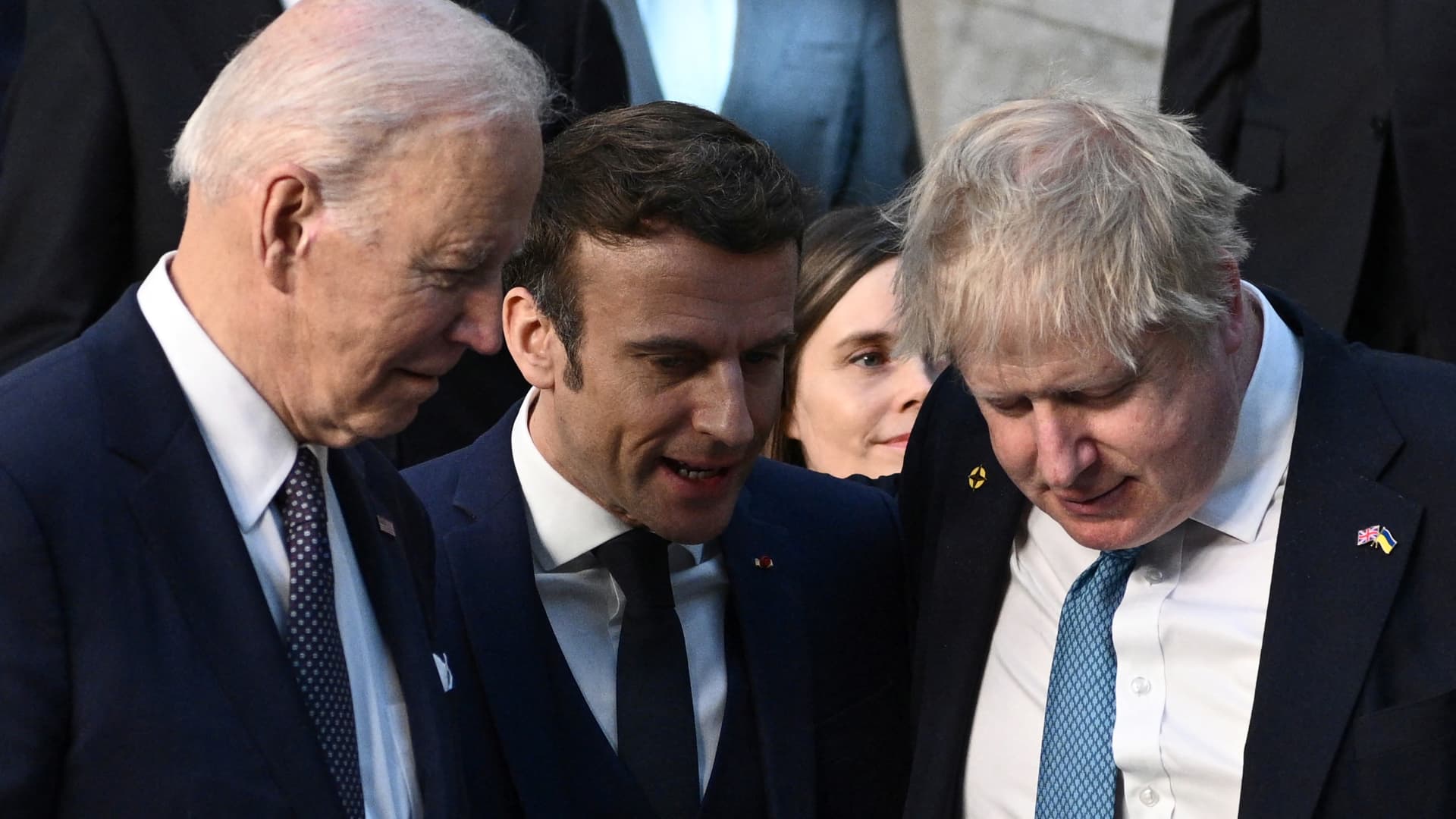
Britain’s Prime Minister Boris Johnson, France’s President Emmanuel Macron and US President Joe Biden talk as they arrive at NATO Headquarters in Brussels, Belgium, March 24, 2022.
Brendan Smialowski | Reuters
NATO has agreed to strengthen its defenses in Europe in the face of Russia’s continuing aggression toward Ukraine.
Speaking after an extraordinary summit of the military alliance in Brussels on Thursday, NATO Secretary General Jens Stoltenberg told reporters that the organization has collectively agreed to reinforce its defense capabilities in the region.
“Today NATO leaders agreed to reset our deterrents and defense for the longer term to face a new security reality. On land, we will have substantially more forces in the eastern part of the alliance at higher readiness, with more pre-positioned equipment and supplies,” he said.
“In the air, we will deploy more jets and strengthen our integrated air and missile defense. At sea, we will have carrier strike groups, submarines and significant numbers of combat ships on a persistent basis,” he added, with members also set to strengthen their cyber defenses.
Further details would be decided at the alliance’s next summit in June, Stoltenberg said. A statement from the alliance at the conclusion of its meeting called Russia’s aggression against Ukraine, “the gravest threat to Euro-Atlantic security in decades.”
“Russia’s war against Ukraine has shattered peace in Europe and is causing enormous human suffering and destruction,” it said.
Global leaders gathered in Europe on Thursday to discuss the war in Ukraine and how to help the country survive Russia’s onslaught. As well as the extraordinary NATO summit taking place in Brussels there are meetings of EU leaders and the G-7.
Ahead of the summit, Stoltenberg said the alliance’s meeting was taking place as leaders faced “the most serious security crisis in a generation.”
Leaders would address this crisis, he said, and its implications “for Ukraine, for NATO and for the whole international rules-based order.”
Stoltenberg, who has extended his tenure as secretary general by a year, said NATO had agreed to increase its military presence in the eastern part of the alliance, with around 40,000 extra soldiers deployed to the region and that significant air and naval assets had been placed under direct NATO command.
NATO had already earlier announced the establishment of four new battlegroups in the eastern part of the alliance, in Bulgaria, Romania, Hungary and Slovakia. These four new battlegroups will be in addition to four other battlegroups already present in the Baltic countries and Poland.
Stoltenberg made separate comments to CNBC Thursday in which he said that “President [Vladimir] Putin has made a big mistake and that is to launch a war, to wage a war, against an independent sovereign nation.”
“He has underestimated the strength of the Ukrainian people, the bravery of the Ukrainian people and armed forces,” he told CNBC’s Hadley Gamble.
Ukraine’s President Volodymyr Zelenskyy also addressed NATO members Thursday and claimed during his speech that Russia has used phosphorus bombs in an attack.
“This morning we had phosphorus bombs from Russia, people were killed, children were killed,” Zelenskyy said during an address via videolink to the NATO summit.
Separately, early on Thursday, the governor of the eastern Luhansk region claimed that four people had been killed after shelling and the use of phosphorus. The governor attached stills and a video, which have not been verified, that he claimed showed buildings destroyed in the attack.
It has not been possible to independently verify the claims made by Zelenskyy and the governor of Luhansk. Zelenskyy provided no evidence in his address.
On Wednesday, the Pentagon was unable to confirm the use of phosphorous when contacted by NBC’s Dan DeLuce.
Zelenskyy also appealed to NATO leaders on Thursday to increase military support for the country.
Russia “wants to go further, against eastern members of NATO, the Baltic states, Poland for sure,” Zelenskyy said in a pre-recorded video address to the NATO summit, Reuters reported.
“NATO has yet to show what the alliance can do to save people,” he said.





